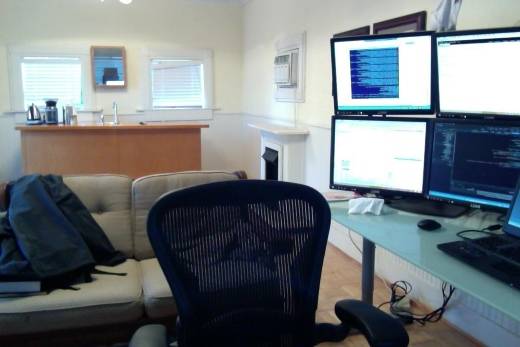This post is presented by Business Is Great Britain.

In an era where more and more corporations are pulling workers into the office, Stack Exchange stands out: The New York-based operator of a network of question-and-answer sites has more than a fifth of its employees working outside its offices.
Former advocates of telework like Yahoo and Hewlett-Packard have pulled back on the practice, citing an “all hands on deck” need to have employees at headquarters to more effectively collaborate on their corporate turnarounds. Perhaps companies in dire straits aren’t suited for remote workers.
But for companies that have embraced a distributed workforce, the benefits are apparent: employees who are happier with their work-life balance, managers who can hire from a broader talent pool, and reduced operational costs.
Stack Exchange was born a remote company. Cofounders Jeff Atwood and Joel Spolsky created the company, originally known as Stack Overflow, at a time when they lived on opposite coasts. Nearly seven years later, Stack Exchange’s network now holds more than 130 question-and-answer sites, covering a wide breadth of topics and attracting 68 million visitors a month, many of them developers. Most of its sites are technical in nature, but there are sites covering video production, biology, and even coffee.
The company has 213 employees. 22 percent working out of the office. Remote workers span 17 U.S. states and 9 other countries in Europe and Asia.
Employees get perks such as gym reimbursement, free health insurance, and stock options after a year—no matter where they are. And Stack Exchange makes sure that even if you’re not in the next cubicle over from a coworker, it feels like you are.
“Google Hangouts are the lifeblood of our organization,” said David Fullerton, Stack Exchange’s vice president of engineering. “If you haven’t tried them for video chat, you’re living in the Stone Age. We have persistent Hangouts for every team available. We spin up one-off Hangouts for quick video chats. We use them for everything.
“When you get to the point where people in the office prefer Hangouts to talking in-person because it’s easier, you know you’re on to something.”

On A “Mission From God” To Make Remote Work Easy
Five years ago, Atwood wrote up his belief that structuring the company around a remote workforce promoted global opportunities in terms of scope and quality of the work. Working alone would be unthinkable, while working in a central office limited a talent pool. The optimal choice, Atwood noted would be a distributed workforce—one where a programmer in Brazil could help a like-minded individual in New Jersey.
Even the obstacle of time zones could be overcome with the right technology and the right meeting structure. Atwood wrote that he and Spolsky wanted Stack Overflow to be populated by people like themselves who “bleed ones and zeroes.”
Two years later, Fullerton added his own 12-point argument for why the company—already much larger—still believed in remote work. In it, he expanded on Atwood’s article by noting that telework is not for every company or every employee:
There’s a tendency to think that working from home is all sunshine and rainbows and working in your PJs. You miss out on being around people (which wears even on introverts), doing fun stuff like playing Ping-Pong or having lunch together and (sometimes hardest of all) you lose a clear distinction between work and the rest of your life. Some people thrive when working from home, while others wither or just … drift. We’ve had people move both ways: remote people deciding to come in to the office, and people in the office deciding to go remote. The key, for us, is offering both and helping people decide which is best for them.
As the company’s lead engineer, Fullerton acknowledges that to make the remote working environment work, there needs to be consistent factors in place such as high-speed Internet access, agreed-upon communication tools, and a willingness to break up tasks into manageable chunks. It also helps that Stack Exchange treats headquarters workers and remote workers similarly, giving them private offices rather than seating them in open bullpens, as many startups do.
“We don’t require people to be at their desks all day long,” Fullerton said. “All of our developers get a private office, essentially as if they’re working from home. They can manage their own workloads as long as they meet their requirements.”
Centers Of Gravity
Stack Exchange has three main offices in New York, Denver and London. The Denver and London offices are primarily staffed with sales and marketing employees. Most employees outside of North America—including France, Germany, Ireland, Israel, Japan, Philippines, Russia, Slovenia, and the United Kingdom—report to managers based in the U.S., but regional offices embrace local quirks.
“It’s great to have an office [in London] because it’s a multicultural center,” Fullerton said.
For Stack Exchange, the typical model of a remote salesforce and an in-house engineering department has been flipped on its head. Sales, marketing, and other management functions are centrally located in one of the three hub offices, while developers and engineers are free to live where they’re most comfortable.
Remote workers are most often developers, designers, and community managers. (There are some regional sales reps who work remotely as well.)
Sweet Equipment
Home offices are set up with similar hardware and software configurations to maintain consistency. The workstations include some “pretty sweet equipment,” Fullerton said, as well as high-speed Internet subscriptions, webcams, and comfy chairs. Stack Exchange reimburses employees for Internet access.
“We had one developer who decided to move from one apartment to another because the Internet connection in his first place was too slow,” Fullerton said.
It helps that Stack Exchange began life as a distributed workforce, establishing cultural habits early. The key is enforcing online communication, making it irrelevant whether two employees are in the same office.
“There’s no halfsies in a distributed team,” Fullerton said. “If even one person on the team is remote, every single person has to start communicating online. The focus of control and decision making must be outside of the office: no more dropping in to someone’s office to chat, no more rounding people up to make a decision. All of that has to be done online even if the remote person isn’t around. Otherwise you’ll slowly choke off the remote person from any real input on decisions.”
That’s why it may be a challenge for big companies that have wavered on remote work to embrace it the way Stack Exchange has. It isn’t just a matter of setting up employees with webcams and high-speed Internet connections; it’s a cultural commitment to doing business a certain way. It’s a good test of whether you really bleed ones and zeroes.
Photos courtesy of Stack Exchange










